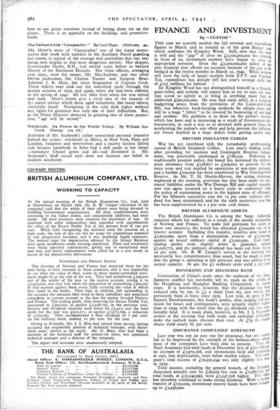COMPANY MEETING
BRITISH ALUMINIUM COMPANY, LTD.
WORKING TO CAPACITY
AT the annual meeting of the British Aluminium Co., Ltd., held at Shrewsbury on March 28th, Mr. R. W. Cooper (chairman of the company) said that the whole of their efforts were being devoted to fulfilling Government requirements. All their establishments were operating to the fullest extent, and considerable additions had been made. All their products were essential for munitions of war. In common with other industrialists they regarded with apprehension the effect of the Excess Profits Tax at the present level of zoo per cent. While fully recognising the national need for taxation on a high scale, the rate of this tax left no scope for expenditure essential in any progressive business, and it was depleting liquid resources. The normal rates for depreciation allowed by the Inland Revenue were quite insufficient under existing conditions. Plant and machinery were being operated continuously, giving rise to exceptional wear and tear, and heavy replacements were called for at a cost much in excess of the depreciation allowances.
NORWEGIAN AND FRENCH ASSETS
The invasion of Norway and France had deprived them for the time being of their interests in those countries, and it was impossible to say what the value of their assets in these enemy-controlled terri- tories might be at the end of the war. They had transferred Lzoo,000 out of the profits of the year to the reserve account, raising it to £2,950,000, and they had taken the precaution of earmarking £5oo,000 of that account against these assets, fully covering the value at which they stood in the books. They Wad, in addition? left upstanding in the accounts the amounts they owed to these subsictary and associated companies in current account at the date the enemy invaded Norway and France. The trading profit? after reserving for Excess Profits Tax, amounted to L900,602, as against £1,058,772, in the previous year. Interest and dividends received were lower by £5,415, and the total profit for the year was £912,211, as against £1,075,796, a reduction of £163,58,i. They recommended a final dividend of 7 per cent. on the ordinary stock, making to per cent. for the year.
Owing to ill-health, Mr- J. S. Bliss had retired from service, having occupied the responsible position of technical manager, with thirty- three years' service to his credit. Mr. G. Boex, who had been a member of the technical staff for twenty-six years, was appointed technical manager and a director of the company.
The report and accounts were unanimously adopted.


























 Previous page
Previous page